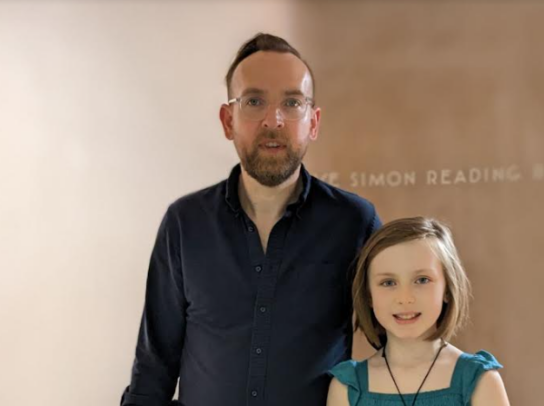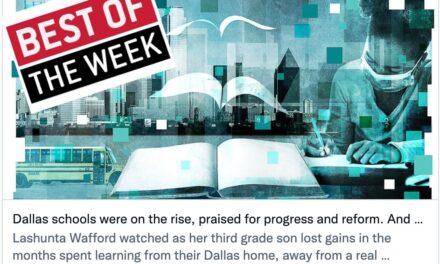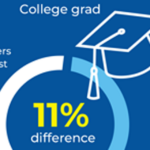In the third installment of our series on literacy coverage, one of the parents featured in “Sold a Story” describes a dispiriting media response to problems at his daughter’s New York City school that continues to this day.
By Alexander Russo
Even before the pandemic, New York City parent Lee Gaul had sensed something seemed off about his daughter Zoe’s reading. “She would use a word that was completely wrong even if it conveyed the same idea,” he told me in a recent interview.
Then, like many other parents, he saw what was being taught in Zoe’s classroom during remote learning.
Looking around for answers to what was going on, Gaul eventually came across Emily Hanford’s documentary “At a Loss for Words” and found out that his daughter’s school was— like many other NYC DOE schools—using the Lucy Calkins (TCRWP) “balanced literacy” approach to teaching reading.
There was even a picture of Calkins schmoozing with the administrative staff in the familiar halls of his daughter’s school.
Trying to get some media attention to address the problems he was seeing, Gaul tried contacting several major local news outlets to tell them about the situation.
But no reporters ever got back to him with substantive interest until he was contacted by APM Reports’ Hanford.
And — even more upsetting — no local reporters followed up with him after he and his daughter were featured in the first episode of “Sold a Story.”
Gaul and I met last spring at the New York City premiere of “The Right to Read,” a documentary about literacy and spoke on the phone about his experience and impressions.
As you’ll see, Gaul’s experience with local media outlets has been nearly as dispiriting as with the NYC schools.
Gaul’s experience with local media outlets has been nearly as dispiriting as with the NYC schools.
Previously in this series: Don’t call it ‘the reading wars’ and Bringing energy and creativity to literacy coverage. Next up: Mandy McLaren, Emily Hanford, and more.
This interview has been edited and condensed.
How did APM Reports’ Emily Hanford initially come to include you in “Sold a Story”?
Lee Gaul: I went to Twitter to try and understand if I was just crazy, or if there really was something going on with how kids were being taught to read. There I found a group of people who seem to be validating some of my suspicions about the fact that kids were being asked to guess, based on pictures and things like that.
Then at some point, I joined an online office hours that the Teachers College had announced for parents. They were going to have Calkins there to answer questions, and I just thought, this is a really good opportunity for me to interrogate what was going on with their program. Once I was done, I put together a tweet thread about it. And it was after that tweet thread that I got a message from Emily asking if I’d be interested in telling her a little bit more about it.
How well did “Sold a Story” capture your and Zoe’s experience and your sense of what had been going on at her school and many other places?
LG: Emily Hanford and Christopher Peak did an excellent job of crystallizing our family’s experience with our own reading crisis. I met with her several times remotely, as well as having her come to visit us to interview Zoe and me. We showed her how we worked together to learn basic phonics principles and even had a specific breakthrough while she was there interviewing us.
One thing that wasn’t in the podcast was how my daughter’s teacher actually worked with us by using the decodable books I had downloaded, as well as committing to covering up the pictures so she could concentrate on sounding out the words. Emily reached out to her but didn’t get a reply. She also tried to reach out to the principal but never heard back.
Was that the first interview request from a member of the media that you’d gotten, or had there been others before that?
LG: Oh, no, that’s it. That’s absolutely the only outreach from anybody in media that I’ve ever had.
What interactions have you had with media?
LG: Before “Sold a Story,” I emailed the New York Times. I emailed Chalkbeat. The national editor from Chalkbeat got back to me and said that it would be interesting to speak with somebody at Chalkbeat NYC. But then there was no follow-up after that.
I didn’t do any other additional sort of outreach once the story came out. I was just trying to get some attention and visibility around the topic, and I felt like the podcast was a thing that that achieved that to a large degree.
Just to be clear, you’re telling me that outlets like NY1, Gothamist/WNYC, The City, the Daily News, the Times Metro section, WNYC’s Brian Lehrer, and the NY Post haven’t covered this story?
LG: I can’t say that they aren’t covering the reading story, but they haven’t contacted me directly. Before I was in contact with Emily, I tried emailing Jumaane Williams, Chalkbeat, and The New York Times, but none of that ever went anywhere. There has been a lot of attention to “Sold a Story” nationally, but I have yet to hear from anyone from the media even after “Sold a Story” was released, even though I am quite easy to find.
That’s absolutely the only outreach from anybody in media that I’ve ever had.
Has there been any other coverage you’ve come across that has followed up as much as you’d like when it comes to NYC schools in particular — even if it’s not your story that they’re telling. Have other NYC DOE parents had their stories told?
LG: As far as I know, “Sold a Story” is really it. Dana Goldstein from the New York Times has been doing some excellent reporting on literacy, but her piece on Lucy Calkins was a bit soft, in my opinion. And yeah, Chalkbeat does have great ongoing coverage about how the NYC DOE has dropped the ball with their purchase of Units of Study, which is Calkins’ program. There is a real groundswell of interest around reading instruction, but honestly there has been no meaningful coverage of New York City parents that I’ve seen.
What do you make of the opinion NYC education insider David Bloomfield shared recently that there are a lot of NYC reporters covering the education beat, but that the coverage often lacks impact because it fails to depict students’ school experiences?
LG: I agree. I think a major reason why “Sold a Story” has had the impact that it had is because it finds a great balance between good investigative journalism and the human stories behind that reporting. My family’s story is impactful because of how common our experience is. It resonates with other people all across the country (and the world) and captures our voices and our experiences, so it is rooted in real human experiences. Stories are incredibly impactful, and good and compelling journalism, married with narrative, is a really effective combination.
What was it like for you to try to bring concern and attention to what was happening and have it not work out for so long?
LG: It felt like being a conspiracy theorist. I was careful to try and think about whether I was in the throes of confirmation bias, or if there really was something there. I felt like an outcast to a degree. Maybe I was this hypervigilant parent who just couldn’t get over the fact that we’re having an issue at home — and that was my problem and that nobody else was having that problem.
For a while that was what it felt like. But the more I researched, the more it became clear that there really was something off about the way the kids in my daughter’s class were being coached to try and guess words based on the pictures instead of how to sound out the letters and make them into words. This compounded my frustration because what I was seeing at home was that teaching Zoe phonics really did help close the gap on her ability to read and sound out words. So I doubled down on trying to get the word out.
What does it feel like now?
LG: I mean, it feels validating. You know, one of the things that’s a little bit strange about it, though, is it feels like there’s been a fair amount of national attention to it, but nobody locally has done any outreach to me about the story. That kind of blows my mind.
Not too long ago, Vulture did an interview with “This American Life” founder Ira Glass and he said that “Sold a Story” has had a real political impact in a way no podcast ever had. And I think that that’s true.
The fact that that people aren’t sort of clamoring to kind of understand a little bit more about the stories of the people that were part of that is crazy to me. I’m a little bit surprised that there hasn’t been a little bit more attention on this. I didn’t get into this for attention. I got into this to help drive some change, and that’s happened. But I’m a little bit surprised.
There has been no meaningful coverage of New York City parents that I’ve seen.
What interactions do you have with other NYC parents about all this?
LG: I’ve had many parents reaching out to me to thank me, ask me for advice, or to extend a compliment to my daughter. Some of these interactions felt more like an interrogation than I’m comfortable with. I recently had someone ask, “Do you really think there’s some conspiracy among Calkins and the Balanced Literacy folks?” or “Are you aware that phonics isn’t the silver bullet of reading instruction?”
Suddenly, I’m viewed by some as another insider in the reading wars with very specific beliefs and actionable insights about what my side believes about reading (as if I’m a part of any side). Well, guess what? I’m none of those things. Do I think there’s a conspiracy? In a way, complacency is conspiracy. If districts, schools, and teachers aren’t constantly interrogating the science of education, that is a willful ignorance that borders on conspiracy.
What do you hope happens next?
LG: I think that the education of children and their ability to read is one of the most profoundly important topics anyone should be interested in, whether you have kids or not. And so if you view it in that context, I think it’s been deeply under-reported. It should be on everyone’s mind and should be top of mind everywhere. It feels like an insane conspiracy has been cracked open. But attention spans are short, and I don’t think that it’s gotten the attention that it needs at all.
My daughter’s school* has gotten an extension, so they are still using the program from Lucy Calkins. Whenever we see a new teacher’s bio, they all proudly list their expertise in Calkins’ program. We see materials from teachers about “just right” books or levels books which have always been a big issue. It’s all so maddening. I’m thrilled that “Sold a Story” has had the impact that it has, but the fact that it hasn’t yet moved the needle for my own kids school is really disappointing.
*Technically, it’s the district that has the extension.
Previously in this series:
Don’t call it ‘the reading wars’ (by Molly Ness)
Bringing energy and creativity to literacy coverage (by Alan Borsuk)
Previously from The Grade
How do we get Black kids’ literacy to matter? Have more journalists cover it. (Colette Coleman)
After ‘Sold a Story,’ what comes next?
How to report on whether district reading programs are any good (Colleen Connolly)
Cracking the code on reading instruction stories (Holly Korbey)
How I missed the phonics story (Patti Ghezzi)
ABOUT THE AUTHOR

Alexander Russo
Alexander Russo is founder and editor of The Grade, an award-winning effort to help improve media coverage of education issues. He’s also a Spencer Education Journalism Fellowship winner and a book author. You can reach him at @alexanderrusso.
Visit their website at: https://the-grade.org/












